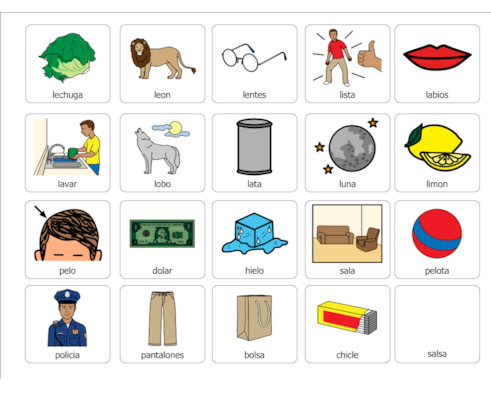Spanish Words That Start With The Letter L
1. luna (moon)
2. leche (milk)
3. libro (book)
4. lápiz (pencil)
5. limón (lemon)
6. limpiar (to clean)
7. lindo/a (beautiful)
8. lago (lake)
9. largo/a (long)
10. ladrón/ ladrona (thief)
11. llave (key)
12. luz (light)
13. leal (loyal)
14. loco/a (crazy)
15. lavar (to wash)
16. lechuga (lettuce)
17. loro (parrot)
18. lumbre (fire)
19. lindo/a (cute)
20. limpiar (to clean)
21. luchar (to fight)
22. león (lion)
23. labio (lip)
24. legumbre (vegetable)
25. llorar (to cry)
26. lucir (to shine)
27. latir (to beat)
28. lanzar (to throw)
29. levantar (to lift)
30. licencia (license)
More About Spanish Words That Start With The Letter L
Welcome to another interesting linguistic journey through the beautiful Spanish language! Today, we will delve into the world of words that start with the letter L. In this vibrant language, the letter L holds an enchanting variety of words, each with its unique meaning and cultural significance.
Spanish is derived from Latin, which explains why many Spanish words are similar to their English counterparts, but with a delightful twist. Exploring Spanish words starting with L will not only enhance your vocabulary, but it will also provide you with glimpses into the rich heritage and diverse cultures of the Spanish-speaking world.
Let’s begin with “lago,” which means “lake” in English. As the Spanish-speaking world spans across various continents, it’s no wonder that Spanish-speaking countries are home to some of the most breathtaking lakes. From Lake Titicaca in Bolivia and Peru, which is not only the largest lake in South America but also the highest navigable body of water in the world, to Lake Atitlán in Guatemala, cradled by mountains and adorned with picturesque villages, these natural wonders are a testament to the beauty that surrounds us.
Moving on, we encounter “libertad,” the Spanish word for “freedom.” This powerful term signifies the universal longing for personal liberty that has played a crucial role throughout history. From the Spanish colonies fighting for independence in Latin America to the fight against oppression in many Spanish-speaking countries, “libertad” represents the idea that all individuals should have the right to live and express themselves freely.
As we continue our exploration, we come across “lengua,” meaning “language.” The Spanish language itself is celebrated for its melodic sounds, expressive nature, and global reach. With over 460 million Spanish speakers worldwide, it is one of the most widely spoken languages and the second most commonly spoken native language after Mandarin Chinese. From the sun-soaked beaches of Spain to the vibrant markets of Mexico and the alluring tango dances of Argentina, Spanish unites people and cultures in a harmonious symphony of words.
Let us not forget about “literatura,” the Spanish word for “literature.” Spain and Latin America boast a rich literary tradition, with numerous Nobel Prize winners and renowned authors such as Gabriel García Márquez, Jorge Luis Borges, and Miguel de Cervantes. Spanish literature transcends boundaries, offering timeless tales that captivate readers across the globe. From the magical realism of magical realism and the complex narratives of modernist works to the historical and social commentaries found in contemporary literature, “literatura” in Spanish is a treasure trove waiting to be explored.
Finally, we encounter “la música,” or “music” in English. Rhythms and melodies are deeply ingrained in Spanish culture. From the passionate flamenco guitar of Andalusia to the infectious beats of salsa and merengue in the Caribbean, Spanish music invites you to feel, dance, and embrace life fully. Listening to the lyrical Spanish language set to music creates a mesmerizing harmony that is felt in the soul.
As we conclude this brief introduction, we invite you to embark on an enriching journey through the countless Spanish words beginning with the letter L. This exploration will not only expand your linguistic horizons but also open doors to cultural understanding and appreciation of the Spanish-speaking world. So, whether you’re sipping mate in Argentina or enjoying paella in Spain, let these L-words become your companions and guides, drawing you into the captivating world of Spanish. Stay tuned for more linguistic adventures that await you!
Spanish Words That Start With The Letter L FAQs:
1. ¿Qué significa “luna” en español?
– “Luna” significa el cuerpo celeste que orbita alrededor de la Tierra y brilla en la noche.
2. ¿Cuál es la traducción de “libro” al inglés?
– La traducción de “libro” al inglés es “book”.
3. ¿Qué es un “lápiz” en español?
– Un “lápiz” es un instrumento de escritura que se utiliza para dibujar o escribir.
4. ¿Cuántas lenguas se hablan en Latinoamérica?
– En Latinoamérica se hablan varias lenguas, pero las más comunes son el español, el portugués y el inglés.
5. ¿Qué significa “leche” en español?
– “Leche” es el líquido nutritivo que se produce en las glándulas mamarias de los mamíferos.
6. ¿Cómo se dice “amor” en español?
– “Amor” se dice love en español.
7. ¿Cuál es la traducción de “lámpara” al inglés?
– La traducción de “lámpara” al inglés es “lamp”.
8. ¿Qué significa “largo” en español?
– “Largo” puede tener varios significados, pero generalmente se refiere a algo que es extenso en longitud o duración.
9. ¿Cómo se dice “hola” en español?
– “Hola” se dice “hello” en español.
10. ¿Cuál es la traducción de “limón” al inglés?
– La traducción de “limón” al inglés es “lemon”.
















